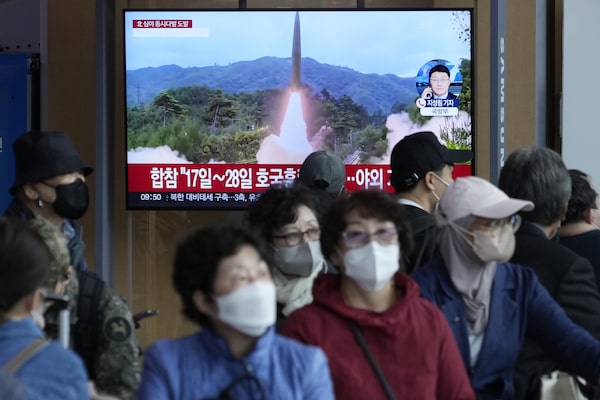
A TV screen shows a file image of North Korea's missile launch during a news program at the Seoul Railway Station in Seoul, South Korea on Oct. 14.Ahn Young-joon/The Associated Press
North Korea fired artillery shells near its sea boundaries with South Korea late Tuesday, a day after the South began annual military drills to better deal with North Korean provocations.
South Korea’s Joint Chiefs of Staff said in a statement early Wednesday that North Korea fired about 100 shells off its west coast and 150 rounds off its east coast. It said the South Korean military broadcast messages several times asking North Korea to stop the firing, but there were no reports of violence between the rivals.
South Korea’s military said the shells didn’t land in South Korean territorial waters but fell inside the northern part of the maritime buffer zones the two Koreas established under a 2018 inter-Korean agreement aimed at reducing front-line animosities.
It’s the second time North Korea has fired shells into the buffer zones since last Friday, when it shot hundreds of shells there in its most significant direct violation of the 2018 agreement.
South Korea’s military said North Korea must halt provocations that undermine peace and stability on the Korean Peninsula. It added that it is boosting its military readiness and, in co-ordination with the United States, is closely monitoring North Korea’s moves.
Hours later, an unidentified spokesperson for the North Korean People’s Army’s General Staff issued a statement describing the latest artillery firings as a response to the South Korean artillery training that it claimed took place earlier Tuesday at a border area. Seoul didn’t immediately confirm it had conducted such artillery drills on Tuesday.
“The enemies should immediately stop the reckless and inciting provocations escalating the military tension in the forefront area,” the North Korean military spokesperson said.
The North Korean spokesperson also lashed out at the South Korean military for kicking off an annual 12-day field exercise on Monday, calling it an invasion rehearsal. South Korea’s Defence Ministry said the training is aimed at improving operational capabilities to counter various types of North Korean provocations and that an unspecified number of U.S. troops will take part in this year’s drills.
The North’s artillery tests draw less outside attention than its missile launches. But its forward-deployed long-range artillery guns pose a serious security threat to South Korea’s populous metropolitan region, which is about 40 to 50 kilometres (25 to 30 miles) from the border with North Korea.
In recent weeks, North Korea has conducted a spate of weapons tests in what it calls simulations of nuclear strikes on South Korean and U.S. targets in response to their “dangerous military drills” involving a U.S. aircraft carrier. North Korea views regular military exercises between Washington and Seoul as an invasion rehearsal.
North Korea has test-launched 15 missiles since it resumed testing activities on Sept. 25. One of them was an intermediate-range ballistic missile that flew over Japan and demonstrated a range capable of reaching the Pacific U.S. territory of Guam and beyond.
Some foreign experts say North Korean leader Kim Jong Un would eventually aim to use his expanded weapons arsenal to pressure the United States and others to accept his country as a legitimate nuclear state and lift economic sanctions on the North.